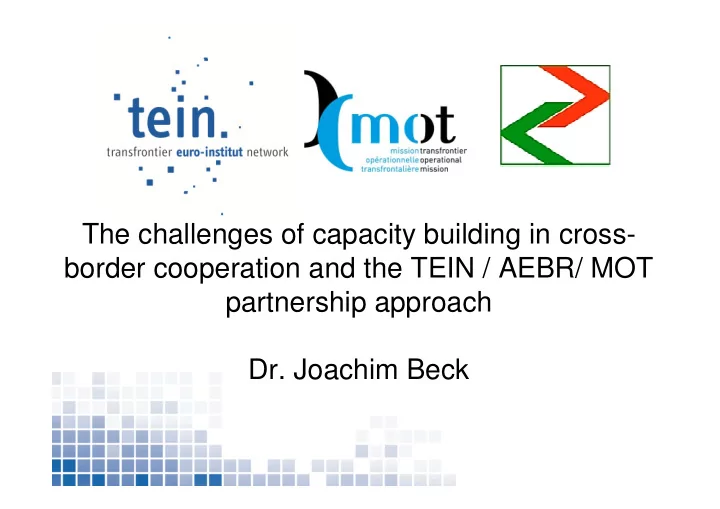

The challenges of capacity building in cross- border cooperation and the TEIN / AEBR/ MOT partnership approach Dr. Joachim Beck
Cross-border territories: the horizontal dimension of European integration • Border regions represent 40% of EU territory and 30% of the EU’s population • Cross-border territories represent key areas, where both the positive effects of European integration as both the positive effects of European integration as well as the remaining obstacles to integration can best be studied • Cross-border territories are regions of potential and thus important catalysts for European Territorial Cohesion
European support (INTERREG, EGTC,…) brought much progress Concrete projects instead of nice ideas… Real partnerships with shared co-financing instead of nice meetings… Integrated programmes instead of stand-alone approaches… Innovative structures instead of institutional sclerosis… CBC territories seen under a 360°perspective: From selective problem perception to a joint development of integrated potentials
Key-challenges of CBC policy-making still unresolved • How to find the functional equivalence between different politico-administrative systems? • How to base future action on a sound knowledge of the cross-border territory and its specific needs? • How to act without substantial competences with New quality of most legal areas remaining with member states? CBC needs CBC needs • • How to turn cultural and linguistic differences into How to turn cultural and linguistic differences into systemic a productive interaction ? capacity-building • How to find the right level of institutionalization, how to integrate new actors from the non-public sector? • How to define and measure the added-value of the integrated cross-border action? • How to overcome a limited project-approach and develop sustainable policy approaches for the cross-border territory ?
Levels of CBC capacity-building 1.) Knowledge generation and management on a 360°basis 2.) Subsidiarity and multi-level-governance (vertical and horizontal differentiation) 3.) Shared cross-border services with joint administrative competencies 4.) Legal flexibility (experimental and opening clauses, exemptions based on de minimis rules) 5.) Professionalization of actors, facilitation and active promotion 6.) Joint interest-representation (consultations, IA System of European Commission)
This requires multi-level-governance • The EU-level anticipates impacts of future EU-initiatives on the cross-border territories (CBC category in the IA system) • The member states support CBC actively and allow for flexible solutions to be developed on the borders flexible solutions to be developed on the borders (“horizontal subsidiarity”: setting the frame via direct coordination between neighboring states in relevant policy fields) • Local and regional actors develop shared cross-border services and transfer real competencies to joint cross- border bodies
A new actor for CBC capacity-building: TEIN as a strong and efficient network of interdisciplinary excellence on training, research and support - www.transfrontier.eu TEIN covers a representative sample of European cross-border regions: � maritime borders, � maritime borders, � old European borders, � new eastern borders, � post-conflict borders, � external borders, � overseas borders between outermost regions.
The TEIN members : • Exchange best practices • Analyse the specificity of training and research on cross-border issues/in cross-border contexts • Capitalize on and draw synergies from different territorial initiatives • Work on new products like – transferable training modules (training for cross-border project managers, etc.), – methods (need-analysis methods in cross-border regions, etc.), – methods (need-analysis methods in cross-border regions, etc.), – tools (impact assessment toolkit, etc.), • Produce valuable research in this field and ensure that newest research results are disseminated to actors involved in cross-border cooperation, • Develop a European certification system on CBC training
The added value of the TEIN / ABER / MOT partnership approach Capacity building for CBC with actions at the level of the border (Euro-Institutes,…) supported by INTERREG A, and actions at EU level (TEIN, AEBR/CECICN SMART Cooperation report) in synergy with network programs such as Interact, in synergy with network programs such as Interact, INTERREG B and C etc…, but also actions at national level, with tools such as MOT, CSCE: Budapest Platform � Making multi-level governance really work to support a new quality of cross-border cooperation in line with the architecture of Cohesion Policy 2014/2020
Thank you ! Dr. Joachim Beck Director Euro-Institut / TEIN Rehfusplatz 11 D-77694 Kehl Tel. +49-7851-7407-27 Fax. +49-7851-7407-33 Mail: beck@euroinstitut.org Mail: beck@euroinstitut.org www.euroinstitut.org TEIN coordinators: Anne THEVENET (thevent@euroinstitut.org) Sebastian RIHM (rihm@euroinstitut.org)
Recommend
More recommend